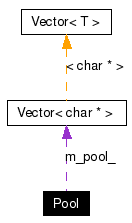
#include <Pool.H>
Collaboration diagram for Pool:

Public Member Functions | |
| Pool (int a_ptrSize, const char *a_name="unnamed", int a_poolSize=100, int a_alignment=sizeof(int)) | |
| ~Pool () | |
| void * | getPtr () |
| request a section of memory of ptrSize_ contiguous bytes. | |
| void | returnPtr (void *a_ptr) |
| return memory previous acquired with the getPtr() function. | |
| long | memUsage () const |
| report how much memory this Pool is currently using. | |
| void | clear () |
Public Attributes | |
| char | m_name_ [64] |
Static Public Attributes | |
| static PoolList * | m_poolList_ |
Friends | |
| void | dumpmemoryatexit () |
Pool is a class to optimize memory allocation. It is specialized to allocate fixed size chunks of memory specified by ptrSize in the constructor. Its operation is analogous to malloc, not new. It does not initialize the memory in any way. The constructor can optionally specify an initial pool size, and memory alignment. The pool size will grow as needed by calling ::new. The pool size never shrinks. Memory will be reclaimed at ~Pool(). The units of poolSize are number-of-ptrSize-chunks. The units of alignment are bytes.
Pool can only be used for objects of fixed size. Typically used in situations where a class or struct is being constantly constructed and deleted. Objects returned by value from functions, elements in a database, etc. Pool's tend to be allocated statically.
(from Copier.cpp)
// static data member s_motionIemPool getting constructed Pool Copier::s_motionItemPool(sizeof(MotionItem), "Copier::MotionItem"); // note the use of a 'placement new' MotionItem* item = new (s_motionItemPool.getPtr()) MotionItem(fromdi, todi, box); // if your object does requires it's destructor to be called. item->~MotionItem(); // then return the memory chunk to your pool s_motionItemPool.returnPtr(item)
Technical note In the event of multi-threading Chombo, we will have to make pool access serialized (locks, single thread access, etc) or implement a fast lock-free version, or go back to new/delete and let the OS be clever again about memory management.
|
||||||||||||||||||||
|
|
|
|
|
|
|
undocumented function, call this at own risk. You must be absolutely positive that you have returned all the ptr's you've asked for, or you can have major seg faults. |
|
|
request a section of memory of ptrSize_ contiguous bytes.
|
|
|
report how much memory this Pool is currently using. memUsage for a Pool only grows until Pool destruction. The Pool object has no knowledge of what pieces of memory it has parcelled out to a user, so it keeps it all available. The user is responsible for not leaking Pool memory. |
|
|
return memory previous acquired with the getPtr() function.
|
|
|
|
|
|
|
|
|
|
 1.4.1
1.4.1